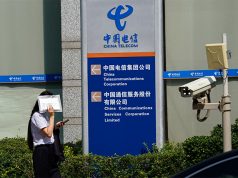
MANILA—China Telecom and firms controlled by a Filipino tycoon jointly bid on Wednesday for a third telecoms license on offer in the Philippines, as the Southeast Asian nation seeks to boost its notoriously weak services and end a domestic duopoly.
State-controlled China Telecom joined businessman Dennis Uy, whose interests include real estate, energy, shipping and logistics, under a consortium called Mislatel, hoping to win a license to challenge existing players Globe Telecom and rival PLDT.
Analysts see the Philippines, with its population of 105 million people, as a potential growth market due to its underdeveloped telecoms and fixed-line services, which consumer groups have complained are unreliable and expensive.
Foreign firms are required by law to join a consortium due to an archaic 40 percent ownership cap in a local telecoms firm, which experts say has limited the growth of a sector worth about $5 billion a year in revenue.
Two other bids were submitted, a consortium of TierOne and LCS Group of Companies and another by Philippine Telegraph & Telephone Corp.
The Mislatel consortium includes three companies, China Telecom, and two of Uy’s firms, Udenna Corporation, a holding company, and Chelsea Logistics Holdings, one of its units.
Chelsea’s share’s surged more than 23 percent on Wednesday following news of the bid.
Philippine President Rodrigo Duterte said two years ago that he would invite competition because of poor services and network coverage, which Globe and PLDT’s mobile unit, Smart, maintain is due to weak regulations and difficulties in obtaining permissions for building telecoms infrastructure.
Duterte had expressed a preference for the third player to be a Chinese firm, and even “offered” it to Chinese Premier Li Keqiang during a visit.
Uy has ties to the president and was a campaign contributor, hailing from Davao, the city where Duterte was mayor for 22 years.
Vietnam’s state-owned Viettel, which had earlier this year expressed interest in the license, is not bidding. “The time is not appropriate for us now,” a Viettel source told Reuters.
An official from Philippine company Now Corp told reporters the firm had decided not to bid, while South Korea’s KT Corp issued a statement at the auction with local firm Converge ICT confirming they had also opted out.
“While the market and industry outlook was financially viable, the conditions imposed for participation render the venture commercially unviable,” KT Corp and Converge said.
—Additional reporting Khanh Vu in HANOI; Writing by Martin Petty; Editing by Muralikumar Anantharaman









